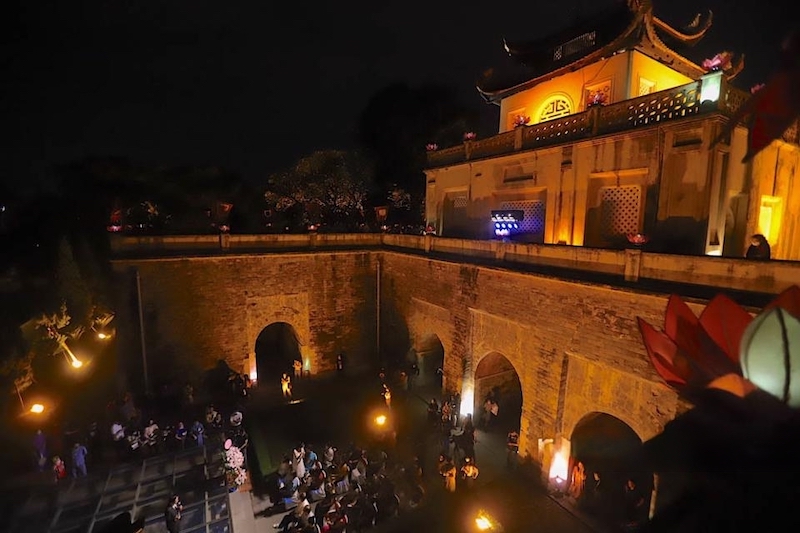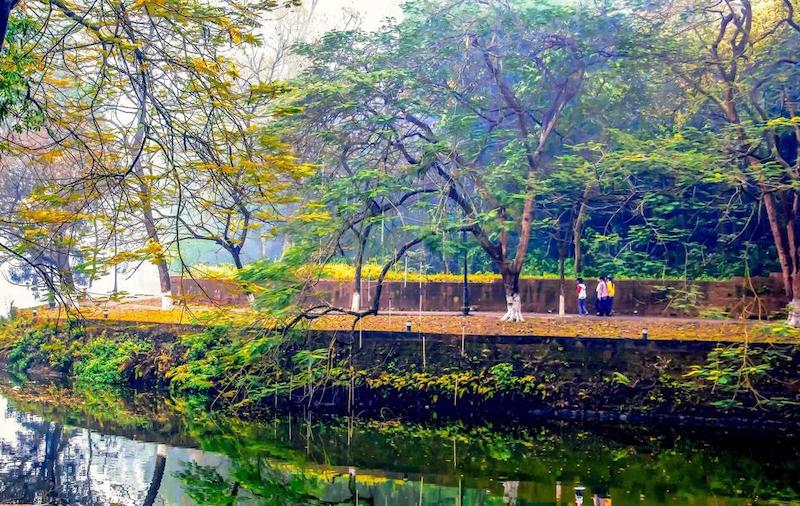The Hanoi Times spoke with Truong Minh Tien, Chairman of the UNESCO Hanoi Association, on ways to expand and link the city's heritage tours.

A night tour at the Imperial Citadel of Thang Long. Photo: Lai Tan/ The Hanoi Times
What do you think about the link between Hanoi's legacy and tourism, given that the city has developed numerous heritage routes to draw tourists?
Cultural heritage is one of Hanoi's strengths. The capital's tourism and culture departments have worked together for many years to develop programs to utilize heritage values for tourism purposes.
The Center for Scientific and Cultural Activities Van Mieu (Temple of Literature) - Quoc Tu Giam (Vietnam's first university) has cooperated with the Vietnam National Museum of Fine Arts to launch a tourism product with the theme "Tradition of Respect for Studiousness". The journey to experience the 90-minute night tour at the Imperial Citadel of Thang Long helps visitors visualize a part of Vietnam's history from the 7th to the 19th century, during the dynasties of Dai La, Ly, Tran, Mac, Le, and Nguyen.
In addition, intangible cultural heritage is also a "gold mine" for tourism development. In particular, the Vietnam Tuong (Classical Opera) Theatre organized a program, "Introducing the Art of Tuong to Tourists" at the Hong Ha Theatre in Hoan Kiem District on weekends. The Vietnam Cheo Theatre, in cooperation with tour operators, launched the Cheo art performance program and included it in tours.
The Hanoi Investment, Trade and Tourism Promotion Center has introduced a heritage educational tour that follows a route from the Thang Long Imperial Citadel to the Co Loa Relic.
Hanoi is a "land of hundreds of trades", with about 800 handicraft villages. Among them are many traditional handicraft villages with history and cultural space, creating diversified and attractive tourism products. So there is a lot of potential to be tapped.

Local visitors explore the ancient Son Tay Citadel. Photo: Dang Thanh/ The Hanoi Times
What solutions are needed to capitalize on the potential of heritage tourism?
Currently, Hanoi has many heritage tours attracting tourists in the inner city and suburban districts, such as Duong Lam, Bat Trang ancient villages, and ancient Son Tay Citadel tours.
However, the culture and tourism industries must work together to create new tours in the suburbs to diversify offerings.
Training in human resources is essential. Those who directly manage and are responsible for the operation of heritage sites must have a good knowledge of heritage to explain it to tourists. At the same time, local authorities should improve people's knowledge and popularize and issue codes of conduct for heritage staff and visitors.
Hanoi should also strengthen the communication and promotion of cultural heritage. Cultural heritage destinations should introduce tangible heritage sites and develop programs to promote intangible heritage, local folklore performances, culinary values, and traditional handicrafts. In addition, local authorities should strengthen the work of ensuring safety, order, and environmental sanitation.
Therefore, the tourism and cultural industries must be repositioned and unified in connecting and developing heritage tours. What is the link between tourism and heritage?
The cultural sector is responsible for heritage, while the tourism industry builds programs. I believe the tourism industry needs to actively cooperate with the cultural sector in building tours. To do this, the tourism industry needs to conduct surveys to identify the advantages and limitations of the tourist sites and then make recommendations to localities and cities to promote the advantages and address the limitations in some issues of reception, transportation, and human resources.
Based on the recommendations of the tourism industry, the cultural industry should actively introduce the unique cultural values of the destination, coordinate to build attractive tours, and harmonize the preservation and promotion of cultural heritage values.
Thank you for your time!
Khanh Khanh